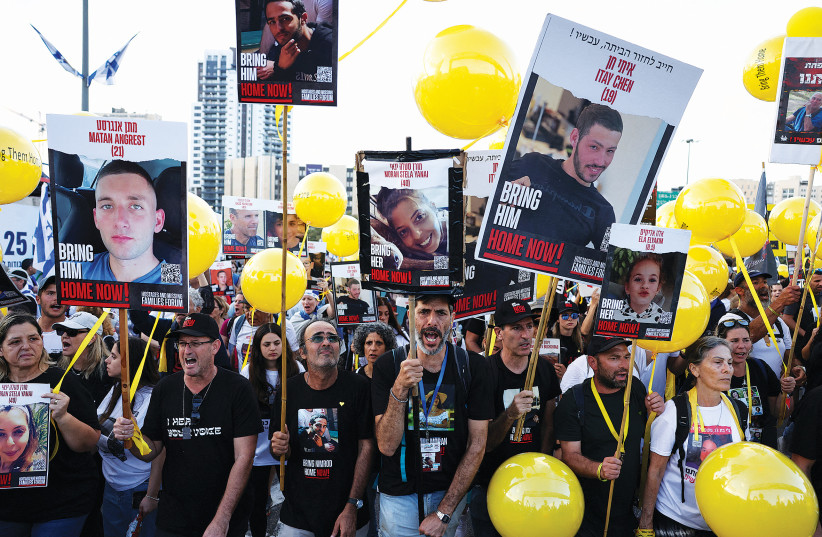"I don't think there is a name for this feeling - having your child, spouse, [or] loved one stolen from you and not being able to do anything about it," Udi Goren, whose cousin Tal Haimi's body is still being held by Hamas, said Thursday, discussing the turmoil the families of hostages are going through as a deal progresses.
Goren stressed that in spite of reports that a deal has been finalized, he would only believe it when he sees it, and he said that this is the most stressful time he remembers for families of the hostages since the first deal in November of 2023.
Contributing to this stress is the knowledge that these are not normal negotiations between two parties, Goren explained, but rather negotiations with a "terrorist organizations that murdered, raped, and took people hostage" on October 7, and that is "doing everything it can to harm us."
Goren's cousin is not listed as one of the 33 hostages set to be freed in the first stage of the three-stage deal, which Goren said is supposed to end with all 98 hostages home.

The families find themselves in a whirlwind of emotion, said Goren, touching on the incredible disparity between the constant fear that any moment might be the last for loved ones in captivity and the possibility that freed hostages could be sleeping in their own beds within a week.
Goren said that he wants to see every hostage back - to see any of them reunited with their families would make him incredibly happy, and on the other hand, for the families whose loved ones are not slated to be released in the first stage of the deal, this is not the end of the road, but the beginning of a new phase of the struggle.
Touching on the impacts of the situation on his cousin's children, Goren said that their mother has been open with them about the situation from day one. "They know their dad is not coming back alive," he said.
There are elements that are harder for them to understand, he added, explaining that because some of Haimi's remains were found, the family held a funeral that the children attended. They have asked, "why do they say Dad is dead if nobody has seen him?" Goren said as an example of the difficulty of the complex situation for the children.
Missing big moments
Haimi's wife was pregnant when he was taken, so while Haimi knew he would be a father to four children, he never met his fourth, who was born six months ago.
There are huge roadblocks to overcome in the process to all the stages of a deal, said Goren, explaining that the first stage of the deal should help to create the conditions and momentum to reach the next phases of the deal. "Everything can go wrong along the way."
"What happens when Hamas says - 'we can't find your cousin?'" Goren offered as an example, wondering if a deal would break down, international guarantees would suffice, and if the political situation in Israel would be such that a deal could make it through such a challenge.
Goren stressed the urgency of advancing a deal now, even in stages, saying that there is no time to spare and that it is important to start getting the hostages out now.
Goren said the families' excruciating wait for the deal to progress is due to the many details that need to be ironed out.
He also added that the time period over which the deal is set to take place leaves more room for things to go wrong. "The longer the deal, the more things can go wrong.”
Touching on political objections to the deal, Goren said that the deal being discussed "is a bad deal. It's a really bad deal - but that is the consequence of October 7."
Nothing good could have come in the wake of the Hamas attack on Israel, he added, saying that in spite of this, a way must be found to end the situation, and there is no other way besides the deal.

Goren also said he does not want to talk about the "price" being paid for each hostage because the situation "is what it is" and that there are no alternatives. If we have learned anything in the last 15 months, it is that the hostages cannot be brought back through military action, he said.
The fear of those worried that terrorists released in a hostage deal might pose a security threat in the future is understandable, Goren added. It will be the state's responsibility to keep track of them and make sure that this does not happen, and more generally, to keep Israelis safe, he said.
It is important to ensure that the country does not return to the security situation of October 6, Goren said, adding he will take part in the fight to make sure this does not happen.
Goren also touched on the fight of some families of soldiers who fell in the Israel-Hamas war to prevent a deal and continue the conflict in order to achieve the goals of the war they say their children died for.
Freeing the hostages is a crucial part of what these soldiers fought for, said Goren, adding that he has been told by many soldiers that the principle that stood before them was bringing the hostages home.
It is the sacrifice of soldiers that has enabled Israel to negotiate from a position of power and achieve a deal to bring the hostages home, he said.
Ariela Ohrenstein and Abigail Rubinstein contributed to this report.
